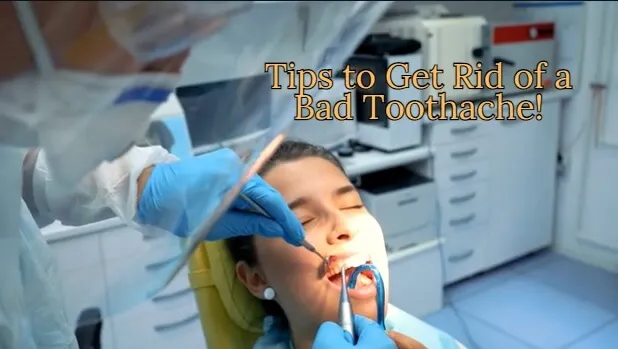How to Get Rid of a Bad Toothache
Tooth pain can be among the most painful and distressing experiences you can have. It can hinder your day-to-day activities, sleep, and state of mind.

If you are experiencing a bad toothache, you might wonder how to relieve it. In this post, I will show you some suggestions and techniques on how to get rid of your toothache, along with some possible causes and avoidance techniques.
What triggers tooth pain?
Tooth pain is typically caused by swelling or infection of the pulp. This is the soft tissue inside the tooth that contains nerves and capillaries. The pulp can become swollen or infected due to numerous factors, such as:
- Dental decay: This is the most typical reason for tooth pain. When germs in your mouth break down sugars and carbohydrates in your food, they produce acids that wear down the enamel. This is the most challenging external layer of a tooth. This can expose the dentin, the soft layer below the enamel, and ultimately reach the pulp, causing discomfort and sensitivity.
- Gum infection: This is a condition where the gums become swollen and contaminated due to bacterial accumulation along the gum line. Dental plaque is a sticky layer of germs on your teeth after eating. If left unattended by brushing and flossing, plaque can harden into tartar, which causes it to bleed and decay. This can develop cavities where germs can build up and contaminate the roots of the teeth, causing discomfort and swelling.
- Tooth damage: This is when a part of the tooth breaks or fractures due to injury, such as biting something sharp, falling, or getting struck in the mouth. A tooth fracture can expose the pulp or damage the nerve endings, causing intense and abrupt discomfort.
- A tooth abscess is an area of fluid that forms around the root of an infected tooth. Bumps can arise from neglected dental caries, gum disease, or tooth fracture. An abscess can cause extreme discomfort, swelling, fever, and bad breath. It can also infect other body parts if dealt with slowly.
- Injured tooth: This is when a tooth stops working to come out entirely or appropriately through the gums. This usually occurs with wisdom teeth, the last molars in your late teens or early twenties. An affected tooth can cause discomfort, pressure, infection, and damage to nearby teeth and tissues.
How to Relieve a Toothache
If you have tooth pain, you should see your dentist immediately to identify and deal with the underlying cause. Nevertheless, in the meantime, you can try some natural home remedies to relieve the discomfort and pain.
Here are some:
- Wash your mouth with warm salt water. Salt water can reduce swelling and eliminate germs in your mouth. Mix half a teaspoon of salt in a cup of warm water and swish it around your mouth for a couple of minutes. Repeat this many times a day until you see your dentist.
- Use a cold compress. A cold compress can relieve the discomfort and lower swelling. Wrap ice or a frozen bag of peas in a towel and use it on your cheek in the afflicted area for 10 to 15 minutes. Do this every couple of hours, as required.
- Take over-the-counter pain relievers. You can take ibuprofen or acetaminophen to eliminate mild to moderate discomfort. Nevertheless, do not exceed the recommended dose of aspirin if you are under 18 years of age. This can trigger Reye's syndrome, an unusual but significant condition that impacts the brain and liver. Likewise, please do not put any pain reliever straight on your gums or teeth, as it can burn your tissues and worsen the situation.
- Use clove oil. Clove oil has natural anti-inflammatory and antibacterial medicinal or pharmaceutical properties that can relieve tooth pain. You can apply a percentage of clove oil to a cotton ball or swab and apply it carefully to the affected area for a few minutes. Additionally, you can blend a couple of drops of clove oil with some olive oil or water and use it as a mouthwash.
- Chew on garlic: Garlic has been utilized for centuries as a natural treatment for different disorders, including toothaches. Garlic contains allicin, a substance with antibacterial and pain-relieving properties. You can squash a piece of garlic and place it in the affected area for a few minutes. You can chew on raw garlic or blend it with salt and use it as a paste.
How do I avoid tooth pain?
The best method to prevent tooth pain is to maintain excellent oral health and visit your dental practitioner regularly for examinations and cleanings. Here are some suggestions on how to keep your teeth and gums healthy:
- Brush your teeth two times a day with fluoride toothpaste. Fluoride can enhance your enamel and prevent dental caries. Utilize a soft-bristled toothbrush and brush your teeth carefully in circular movements for 2 minutes. Ensure to brush all surface areas of your teeth, including the chewing, inner, and external sides.
- Floss your teeth once a day. Flossing can help remove plaque and food particles stuck between your teeth and under your gums. Use about 18 inches of floss and wrap it around your middle fingers. Move it carefully between your teeth and bend it around each tooth. Move it up and down to clean the sides of your teeth below the gum line.
- Wash your mouth with mouthwash. Mouthwash can clean away germs and particles from your mouth. It can refresh your breath and eliminate foul odors. Consider using a mouthwash that contains fluoride, antibacterial, or antibacterial components. Swish it around your mouth for 30 seconds and spit it out. Do this after brushing and flossing or as directed by your dentist.
- Prevent sweet and acidic foods and beverages. Sugar and acid can damage your enamel and cause dental caries. Limit your consumption of sweets, chocolates, cakes, cookies, sodas, juices, sports beverages, and other sweet or sour foods and drinks. If you consume them, wash your mouth with water later or brush your teeth as soon as possible.
- Consume lots of water. Water can help keep your mouth fresh and remove food particles and germs. It can also prevent dry mouth, which increases the danger of dental caries and gum disease. Consume at least eight glasses of water daily if you are thirsty.
- I stopped smoking cigarettes. Cigarette smoking will stain your teeth, harm your gums, and increase your oral cancer risk. It can also hinder your immune system and make it harder to recover from infections and injuries. If you smoke, stop as soon as possible or seek assistance from a medical professional or support system.
- See your oral health specialist regularly. Your dentist can discover and deal with tooth issues before they worsen and cause tooth pain. You must see your dentist at least twice yearly for regular examinations and cleanings. Your dentist can also recommend the best oral care products and procedures for your needs and requirements.
Final thought
Tooth pain is a common but undesirable condition that impacts anyone at any age.
It can have numerous causes, such as dental caries, gum disease, tooth fractures, abscesses, or an affected tooth. If you have tooth pain, you must see your dental specialist as soon as possible to discover the cause and get the correct treatment.
In the meantime, you can attempt some natural home remedies to relieve the discomfort. These remedies include washing with salt water, using a cold compress, taking pain relievers, utilizing clove oil, or chewing garlic.
You can avoid tooth pain by avoiding sweet and acidic foods and beverages. You can drink water, stop smoking cigarettes, and visit your dentist regularly.
This article was helpful and valuable for you.

